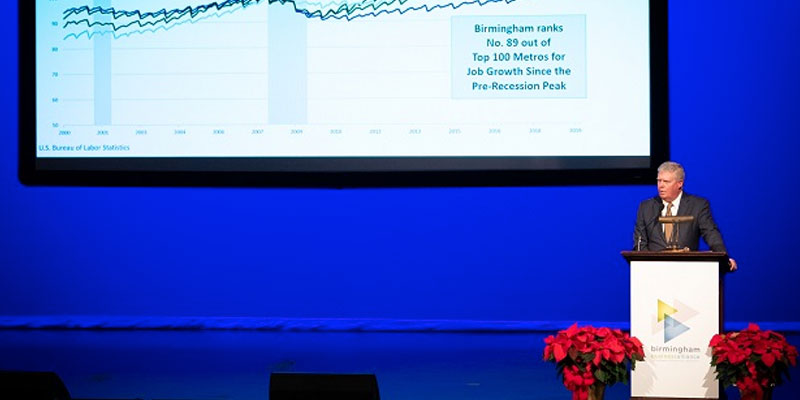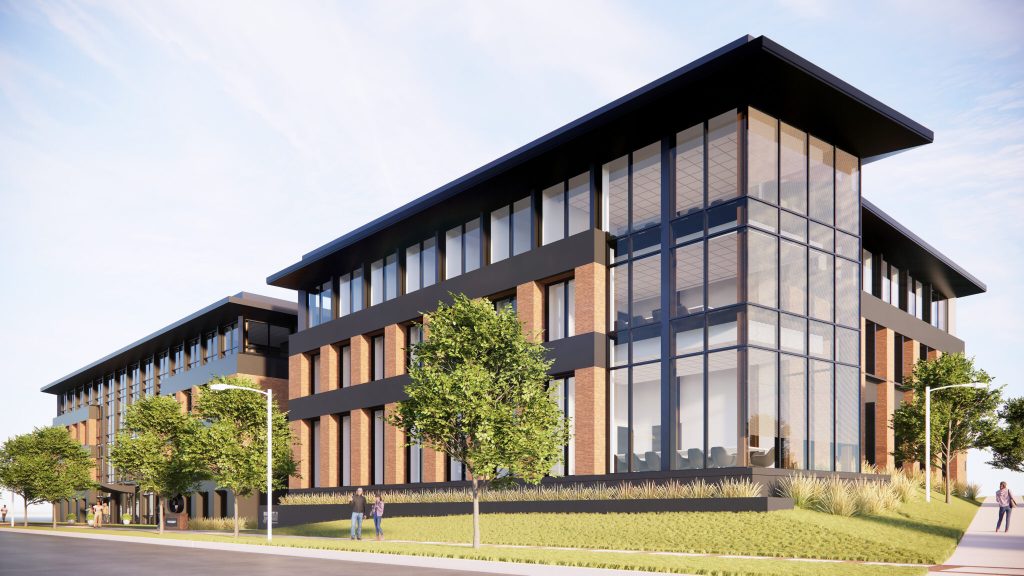The Birmingham Business Alliance revealed a new mission and a new approach to economic development as it heads into 2020.
The BBA’s 2019 Chairwoman’s Annual Meeting was at the Lyric Theatre in Birmingham Dec. 11. Chairwoman Nancy Goedecke passed the gavel to Jim Gorrie, president and CEO of Brasfield & Gorrie.
Gone is Blueprint Birmingham, which guided the BBA through its first 10 years. In its place is a strategy that keys in life sciences, advanced manufacturing and technology. Those are some of the main industries the Alabama Department of Commerce is expected to emphasize in its revision of Accelerate Alabama, the state’s economic development plan.
“Those are the three areas that we’re going to focus on,” said Fred McCallum, interim CEO of the BBA. “I will tell you that when you look at our state plan, there are a lot of similarities.”
Birmingham Business Alliance announces new direction from Alabama NewsCenter on Vimeo.
A main component to Blueprint Birmingham was a set of metrics that measured Birmingham’s success against a cluster of peer cities. Doing so often looked too broadly, McCallum said.
“Blueprint was a good plan at the time,” he said. “It was very wide and in some ways it was successful and in other ways it wasn’t so successful. I think what we’ve come to now is a point in time where we’ve got to focus in on jobs and economic growth.”
There will be a new set of metrics created and benchmarked in a new BBA strategic plan, McCallum said.
Birmingham Mayor Randall Woodfin did highlight one comparison between Birmingham and other cities.
“Since the great recession around 2008, 60% of all jobs have only gone to 25 cities in America,” Woodfin said. “You need to know that Birmingham is not on that list.”
Woodfin feels Birmingham should measure itself against its own potential instead of comparing itself to others.
“We don’t have to be like Nashville or Chattanooga or Atlanta or Austin,” he said. “We need to be the best version of ourselves. But that is going to require us to shake off the way we’ve always done things.”
Woodfin said the companies and organizations that make up the BBA should be prepared to take greater risks and push boundaries.
“Being risk-averse at this time as we move into 2020 … will not work for us – as an organization or for our city,” he said. “So the question becomes when you walk out of this room, are we prepared to invest in our competitiveness? Do we want to compete? Do we want to set ourselves apart, not be like any other city in America?”
A primary goal for the BBA is to find a new CEO. McCallum has led the organization on an interim basis after former CEO Brian Hilson stepped down at the end of March. Hilson now works on rural economic development initiatives in the state.
Other changes will include aligning the BBA’s internal strategy to execute the new strategic plan, updating its governance structure to be more effective and efficient and aligning the funding model to support the BBA’s new strategic plan.
“I think the organization will be more focused on specific strategies and focused on doing what we do well,” McCallum said.
McCallum believes Birmingham leaders and economic developers can tell the region’s story more forcefully and proactively.
“We’re on a good trajectory. I feel good about where we are as a community,” McCallum said. “Our leadership is strong. Our public leadership is strong. Our private leadership is strong. I feel good about where the BBA is focused.”
This year’s annual meeting was more a call to action than the rah-rah sessions of the past.
“Usually I would get up here and give you all some stats about what we’ve done and what we’ve accomplished,” Woodfin said. “I think it is fair to say that 2019 has been a good year for many of your organizations individually and collectively for our Birmingham Business Alliance.”
It was a good 2019 in the Birmingham metro area. Halfway through the year, the region reached and surpassed its pre-recession height of employment. There were 32 projects with 1,180 jobs and $492.2 million in capital investment announced in the region in 2019.
(Courtesy of Alabama NewsCenter)













